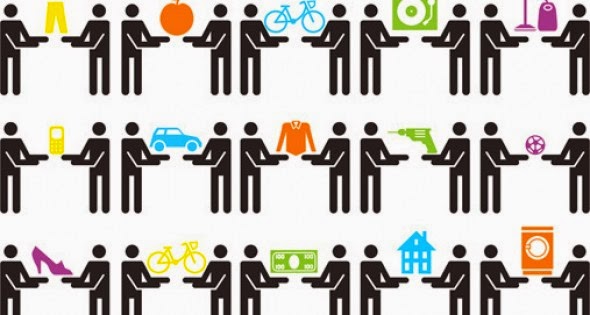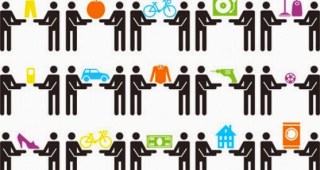
This is the third summer update on TrendsWatch 2014: you can catch up recent developments in Social Entrepreneurship and Big Data in previous posts.
Overall Arc of the Trend
Up, rapidly, with notable speed bumps.
 |
| Image from Center for Popular Economics |
A quick reminder about why museums should care: the rise of an economy based on peer-to-peer transactions, facilitated by internet-based services that help match providers with consumers, and verify trust, could profoundly disrupt museums’ operating environment in a number of ways. This isn’t just about whether museums find ways to “share” their resources in this new economy. Collaborative consumption is beginning to reshape travel and tourism (how people get places, where they stay) and could transfer wealth from traditional industries to new companies that might become museum partners, donors and supporters. It creates new work opportunities, perhaps making it easier for young people to supplement low-wage work in nonprofits with flexible “gigs.” More profoundly, it may shift cultural attitudes towards ownership, consumption and (by extension) collecting.
Here is one measure of the impact of the sharing economy: AirBnB, the peer-to-peer short term home rental site, was recently valued at $10 billion. A report due out this week projects that the “top five sharing economy sectors to generate around $335bn in global revenues by 2025, up from $15bn today.” But the hotel and taxi industries are beginning to push back, arguing that the sharing economy companies are competitive in part because they are not subject to the same regulations and fees as traditional service providers. This, in turn, has sparked debate over whether we in the US have over-regulated some areas of the economy. Are some constraints, like taxi medallions, more about trade protectionism than about public safety? Would a light regulatory touch help the emerging economy of sharing fuel economic growth?
The conversations playing out in academic journals, the press and the blogosphere are about more than just whether cities should regulate companies based on collaborative consumption, and levy fees comparable to those paid by their competitors. They explore how the rise of services based on “sharing”—using the internet to create efficient matches between sellers and markets—may reshape our economy, our politics, even our cultural norms. Some questions raised in these debates in recent months:
What are the long term economic implications of collaborative consumption? Will it be a boon to people struggling to find work and “save the least advantaged from the ravages of capitalism” as the CEO of Airbnb contends? Could the sharing economy evolve to the point where it effectively cuts out the middle man (even companies like Airbnb), making sure that workers gets to keep the full value of the services they provide?
Or is collaborative consumption turning into a new form of union-busting and labor exploitation, making an end run around worker protection laws? Is it a way of making “poverty palatable” by creating businesses on the backs of people just trying to scrape by? Will it, by creating a hyper-efficient marketplace, depress prices and make just a few large companies rich?
Will collaborative consumption woo a younger generation to a Libertarian world view by aligning nimble, tech-savvy startups with proponents of small government, while the Democratic establishment supports legislation that favors unions? Or will it create a new pool of workers who will revitalize the unions when they decide to organize?
Could “sharing” help save the planet by enabling us to make more efficient use of what we have? While the original business model of services like Lyft won’t reduce the overall number of cars on the road (since the same number of people are driving), ubiquitous car-sharing could reduce the number of cars manufactured and sold. And now both major car-sharing services—Lyft and Uber—are folding carpooling into their model as well, by offering discount pricing to people willing to share their rides. If this kind of ride-share takes hold, these services would begin to reduce the number of cars on the road (and gas usage, and emissions) as well.
On the other hand, people have raised concerns that companies like Lyft, Uber and Airbnb may reduce the access of people with disabilities to transportation and short-term housing, to the extent that they undermine traditional services that are subject to ADA or government services such as public transportation. Harvard Business School released research showing that online marketplaces such as Airbnb can uninentionally foster racial discrimination. I can’t find any data on the demographics of people who drive for alternative transportation companies as compared to taxi services, but most of my Lyft drivers have been young and well-educated, often white and female. That may make me feel comfortable as a rider, but I wonder how it impacts the job prospects for the people who typically drive taxis in the US—who are predominantly male, on average middle-aged, and often first generation immigrants.
When I wrote TrendsWatch last fall, I strained to find examples of museums adapting collaborative consumption to their operations, and frankly I’m still not seeing a lot of pick-up in our field. The Dorset County Museum in the UK is incorporating co-storage space into their £13.3 million expansion–building more storage than they immediately need with the intent of offering to other museums. I’ve heard from one museum planning to incorporate co-working space into a renovation (more on that when it goes public). Do you have any examples to share of museums incorporating resource-sharing into their facilities, income models or programming?
Recommended Read
Nonprofits should lead the sharing economy
Stanford Social Innovation Review
The sharing economy is creating new business models, forcing traditional for-profit businesses to adapt or fall behind. The same will hold true for the social sector. Driven by the recession and evolving values, the sharing economy has become a movement heralding access over ownership and trust through transactions. The list of companies engaged in the sharing economy is long, growing and global. It touches all sectors, and utilizes network-enabled sharing to connect users and reduce friction and costs. The sharing economy’s “triple bottom line” (financial, environmental and social) aligns well with the social sector, and there are a handful of nonprofit success stories. These sharing economy nonprofits create new online marketplaces that extend networks, and connect people and resources. Includes recommendations on how nonprofits can begin to take advantage of the opportunities presented by the rise of this economy, including increased shared use of independent skilled workers.
Stanford Social Innovation Review
The sharing economy is creating new business models, forcing traditional for-profit businesses to adapt or fall behind. The same will hold true for the social sector. Driven by the recession and evolving values, the sharing economy has become a movement heralding access over ownership and trust through transactions. The list of companies engaged in the sharing economy is long, growing and global. It touches all sectors, and utilizes network-enabled sharing to connect users and reduce friction and costs. The sharing economy’s “triple bottom line” (financial, environmental and social) aligns well with the social sector, and there are a handful of nonprofit success stories. These sharing economy nonprofits create new online marketplaces that extend networks, and connect people and resources. Includes recommendations on how nonprofits can begin to take advantage of the opportunities presented by the rise of this economy, including increased shared use of independent skilled workers.
To Add to Your Scanning Feed
Collaborative Lab is a for-profit company offering consulting advice on the collaborative economy. It was founded by Rachel Botsman, whose 2010 book “What’s Mine is Yours: The Rise of Collaborative Consumption” and TED talk that same year focused attention on the growth of “sharing.” The Collaborative Labs website features stories about the sharing economy pulled from around the world, and you can subscribe to updates via a free e-newsletter.
Related Articles
NPR
[NPR asked listeners about their] experience with the peer economy in our weekly Twitter chat. Guest Denise Cheng (@hiDenise), an independent researcher affiliated with the MIT Center for Civic Media who specializes in the peer economy, provided an academic perspective. Transcript of the Twitter chat includes interesting (140 character) perspectives on the social dynamics of “trust” in the sharing economy.
LA Times
What troubles me most about the sharing economy is that we’re celebrating a system that, at its core, is a reflection of our desperate times. While it’s true I know people Uber’ing for fun, I also know people who are Uber’ing after work because they’re underpaid at their full-time career jobs — no doubt exhausting endeavors that leave them pretty burnt out as it is. (That’s another consequence of the technological revolution coinciding with the economic downturn.)
The Guardian
Anyone would think the sharing economy was promoting sex trafficking. In recent weeks, this socio-economic ecosystem built around the sharing of human and physical resources (yes that’s the actual definition for those who are confused) has come under unwarranted attack. The sharing economy is a hybrid economy where there are a whole range of currencies. Sometimes goods are exchanged for other goods, sometimes alternative currencies are used, sometimes people pay (yes, with real cash) sometimes people choose just to freely share what they have.
Popular Economics
The greatest problem with the sharing economy is not that it is unregulated, but that it is undemocratic. There is certainly a role for government regulation. But governments cannot and will not regulate many important, details that govern how these platforms operate. To improve these internal policies, we should recognize that people who use online platforms are not just “users” but rather active participants in a new movement that may radically improve how we consume goods. Members of online platforms should be given some power to determine the structure of their interactions. The success of the corporate sharing economy suggests that a democratic sharing economy could be truly transformative. Instead of merely regulating corporate platforms, popular economists should address how we can build democratic platforms for sharing goods, reducing waste, and building community.








